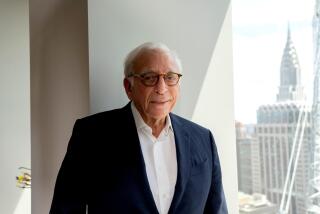Berlitz Is Booming, but Its Maxwell Tie Is Hard to Translate
- Share via
NEW YORK — Berlitz International Inc., a company whose name is synonymous with language instruction, was a jewel in the crown of Macmillan Inc. until Robert Maxwell came along and bought Macmillan for $2.6 billion in 1988.
Now, with Maxwell dead and his empire in a shambles, the publicly traded company with operations in 28 countries is struggling to avoid being misunderstood.
“We are a separate company, and our assets are under our own control,” insisted Elio Bocchitto, the Italian-born president and chief operating officer of Princeton, N.J.-based Berlitz. “We have become part of this mess through no fault of our own.”
But what a mess it is.
Since Robert Maxwell’s naked body was found floating in the Atlantic off the Canary Islands last month, Berlitz has been buffeted by forces beyond its control. Though the company’s fundamentals are strong, its future remains clouded by the morass of self-dealing that came to characterize the Maxwell empire.
The company’s chairman and chief executive, David L. Shaffer, resigned Monday to have more time to sort out the ruins of Maxwell’s U.S. holdings. Investor Joe M. Rodgers, a former U.S. ambassador to France, was named chairman and acting CEO. He immediately issued a statement emphasizing the firm’s independence from other Maxwell companies.
Berlitz officials, meanwhile, can’t even identify the rightful owners of 22% of the company’s stock.
“The lawyers and the accountants have their work cut out for them,” said Jane Gilday, an investment analyst with Tucker Anthony, a Boston brokerage firm. “But in the global village of the ‘90s--with English increasingly becoming the dominant language of communications, business and science--there is no company like Berlitz.”
In addition to running 300 language schools, Berlitz also provides translation services to businesses and publishes travel books, phrase books and other language-related products.
The company boasted a five-year compounded sales growth record of 22.1% annually through the end of 1990.
But through the first nine months of 1991, sales growth slowed to 2.8%--just over $193 million, versus $188 million a year earlier. Net income in the first nine months was $17.5 million, compared to $17.2 million a year earlier.
Just who owns Berlitz is a subject of some dispute.
Until recently, Maxwell Communication Corp., the Maxwell flagship that sought court protection from creditors under Chapter 11 of the bankruptcy code last week, was believed to own 56% of Berlitz’s stock through its ownership of Macmillan. The public owned 44% as a result of an initial stock sale in 1989.
But since Maxwell’s death, two of his creditors, Shearson Lehman Bros. and Swiss Volksbank, have laid claim to more than a third of Macmillan’s Berlitz shares. Shearson, which says it owns a 10% stake in the company, and Swiss Volksbank, which claims 12%, say the Berlitz stock was pledged to them as collateral for loans to Maxwell enterprises.
The disputed ownership has delayed Macmillan’s agreement to sell its entire 10.6-million-share stake to Fukutake Publishing Co. of Japan for $25 a share.
“It’s a little confusing now,” admitted Bocchitto. “Nobody knows who owns what.”
Further complicating the picture is Berlitz’s ownership of notes issued by Maxwell Communication Corp. with a total face value of $123 million. Maxwell, in turn, owns preferred stock in Berlitz with a face value of $180 million. Berlitz has suspended the 7% dividend on the preferred stock as a result of the Maxwell Communication bankruptcy court filing.
“The transaction was designed to be a wash,” said Berlitz Chief Financial Officer Robert Minsky. “When the notes were repaid, the preferred would be redeemed. . . . Even if we were to write the notes off, it would be a non-economic event.”
As a result, he noted, Berlitz stock has held up quite well in spite of the Maxwell mess. The stock closed Friday at $17.875, down 12.5 cents a share on the New York Stock Exchange--around where it traded at the time of Maxwell’s death.
Berlitz provides an instructive example of how Robert Maxwell was able to pull cash out of companies under his control.
Shortly after he acquired Macmillan, he had Berlitz declare an $80-million cash dividend to Macmillan and lend a further $99.6 million to Maxwell Communication--funds siphoned from a Berlitz bank loan repaid, for the most part, when the company went public.
Of the loan to Maxwell Communication, Berlitz said in a filing with the Securities and Exchange Commission: “The terms of the loan were not established by arms-length bargaining.”
More to Read
Inside the business of entertainment
The Wide Shot brings you news, analysis and insights on everything from streaming wars to production — and what it all means for the future.
You may occasionally receive promotional content from the Los Angeles Times.










